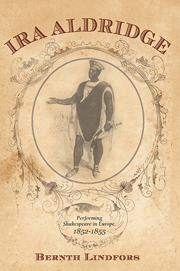Book contents
- Frontmatter
- Contents
- List of Illustrations
- Acknowledgments
- Abbreviations
- Introduction
- 1 Making Up a Company
- 2 Brussels
- 3 Navigating up the Rhine
- 4 Moving into the Interior
- 5 Berlin
- 6 On to Vienna
- 7 Hungarian Rhapsodies
- 8 Comparisons and Contrasts
- 9 Personal and Personnel Matters
- 10 Hungarian Rap Sheet
- 11 Prussia, Germany, Switzerland
- 12 Homeward Bound
- 13 Interpreting Shakespeare
- 14 Further Travels
- Appendixes
- Notes
- Selected Bibliography
- Index
- Miscellaneous Endmatter
5 - Berlin
Published online by Cambridge University Press: 05 December 2013
- Frontmatter
- Contents
- List of Illustrations
- Acknowledgments
- Abbreviations
- Introduction
- 1 Making Up a Company
- 2 Brussels
- 3 Navigating up the Rhine
- 4 Moving into the Interior
- 5 Berlin
- 6 On to Vienna
- 7 Hungarian Rhapsodies
- 8 Comparisons and Contrasts
- 9 Personal and Personnel Matters
- 10 Hungarian Rap Sheet
- 11 Prussia, Germany, Switzerland
- 12 Homeward Bound
- 13 Interpreting Shakespeare
- 14 Further Travels
- Appendixes
- Notes
- Selected Bibliography
- Index
- Miscellaneous Endmatter
Summary
Aldridge and his troupe began the new year in Berlin, opening in Othello at the Royal Court Theater (Königliche Schauspiele) on January 3. With a population approaching half a million, Berlin was far larger than any other city they had visited, and the Royal Court Theater, which seated 2,078, provided them with the largest audience they had ever had. Clearly, after half a year of touring, they had finally reached the top rank of the German theatrical world.
Berlin had a number of influential newspapers, two of them—the Königlich privilegirte Berlinische Zeitung von Staats- und gelehrten Sachen (popularly known as the Vossische Zeitung) and the Berlinische Nachrichten von Staats- und gelehrten Sachen (popularly known as the Spenersche Zeitung)—centuries old, and three others—the National-Zeitung, the Neue Preussische Zeitung, and Die Zeit—much younger, having sprouted up after the 1848 revolutions in Europe. All of them carried cultural news, including reviews of locally produced plays and reportage on significant theatrical events elsewhere. Several of Germany's leading theater critics wrote for such media and took great interest in new foreign performers. Aldridge attracted immediate attention. Some of this attention was positive, some negative, and some mixed, but everyone who wrote about Aldridge found him a bracing presence, someone quite different from any German actor they had seen perform the same Shakespearean roles.
- Type
- Chapter
- Information
- Ira AldridgePerforming Shakespeare in Europe, 1852-1855, pp. 66 - 83Publisher: Boydell & BrewerPrint publication year: 2013

